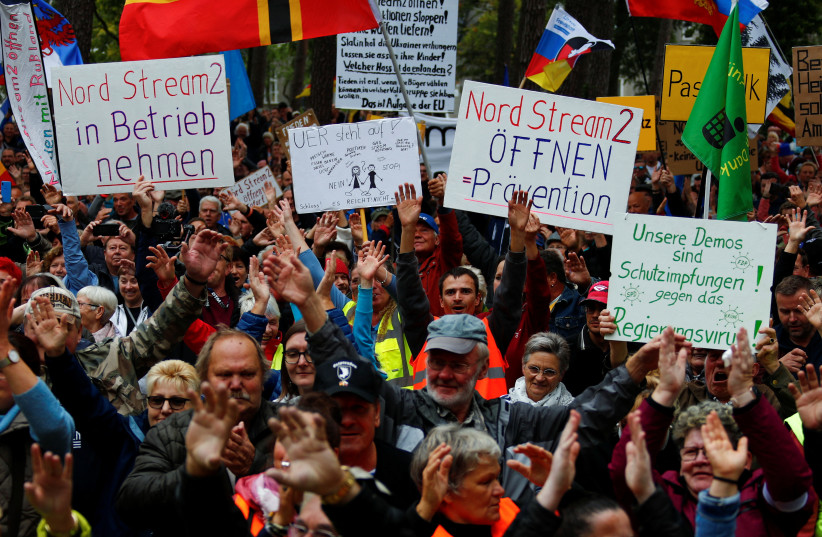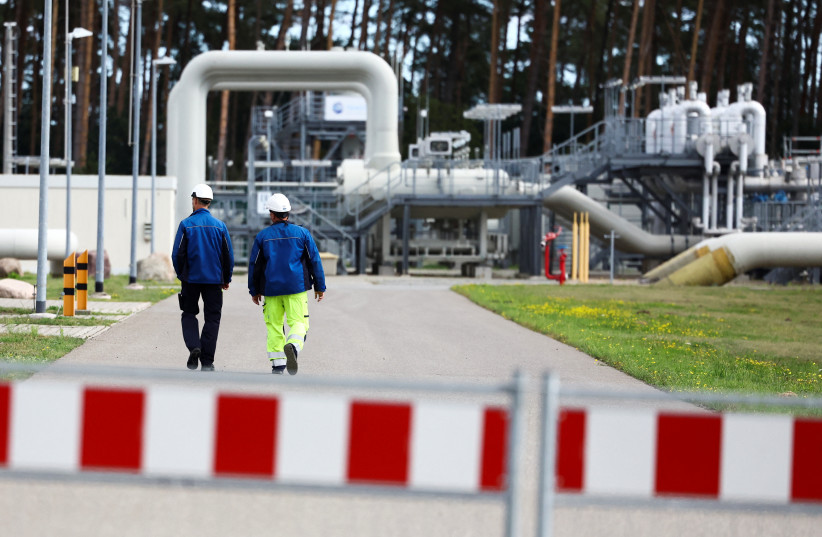A reported gas leak in a Russian pipeline under the Baltic Sea appears to come at the worst possible time as tensions over Ukraine increase and European countries fear a winter of discontent. According to reports published Tuesday, European countries "scrambled to investigate unexplained leaks in two Russian gas pipelines running under the Baltic Sea near Sweden and Denmark."
The incident comes the same day as reports noted the launch of Baltic Pipe, a line that will give Poland and Denmark gas from Norway.
What does this mean? Sweden says there are two leaks in the Nord Stream 1 pipeline, both of which occured shortly after a leak on the nearby Nord Stream 2 pipeline was discovered that had prompted Denmark to restrict shipping within a five-nautical mile radius. According to statements from Sweden on the matter, the damage is “unprecedented.”
"It is hard to imagine that [the Nord Stream leak] is accidental. We cannot rule out sabotage, but it is too early to conclude."
Danish Prime Minister Mette Frederiksen
This seems like a strange coincidence. Modern pipelines are not supposed to suddenly sustain damage or start leaking. According to the reports “neither pipeline was pumping gas to Europe at the time leaks were found amid the dispute over the Ukraine war, but both still contained gas under pressure. The incidents will hinder any effort to start or restart either pipeline for commercial operations.”
Back in early September, Russia had shut the Nord Stream 1 gas pipeline and reduced the flow of gas being directed to it. This was a predictable Russian retaliation against Western sanctions they faced following their invasion of Ukraine. Russia has often used energy supplies as a weapon and as a means of blackmailing other countries. Some European countries, particularly Germany under Angela Merkel, sought to connect to Russia’s gas, thus creating dependency on it.

The US response to the Nord Stream pipeline
The US administrations of both former presidents Obama and Trump were concerned about Nord Stream 2 and about Europe being dependent on Russia for gas, although other American officials had differing views on the matter. In 2018, Foreign Policy published a piece that claimed “What’s Good for Russian Gas Is Good for America: Washington's opposition to a gas pipeline connecting Russia and Germany has never made sense.” The US was so deeply concerned about Nord Stream 2 that it warned companies not to work on it.
Last year, US Secretary of State Antony Blinken said in a statement that any entity involved in the pipeline risks US sanctions and should stop its involvement. “As the President has said, Nord Stream 2 is a bad deal — for Germany, for Ukraine, and for our Central and Eastern European allies and partners," he said at the time.
"As multiple US administrations have made clear, this pipeline is a Russian geopolitical project intended to divide Europe and weaken European energy security.”
Now things seem to have gone from bad to worse. Russia has been saber rattling recently. It is trying to mobilize hundreds of thousands of men but the regime in Moscow is watching them flee the country. Moscow has also been hinting at a nuclear standoff with the West, and now, suddenly a “mysterious” event has occurred off of the Danish coast.
What is the significance of the possible attack?
If this was a targeted attack on the pipelines it would serve to demonstrate how energy is increasingly being weaponized.
The mysterious happenings at the pipeline come as some media outlets reported protests in Germany regarding energy prices. Germany’s Die Welt said that “federal authorities apparently consider targeted attacks to be the cause of the leaks in the two Nord Stream pipelines." And, according to their report, this information was "learned from security circles, meaning that "Sabotage is therefore expected due to the timing, the three lines affected and the strong pressure losses in Nord Stream 1.”
The attack would be anything but trivial, the article says, suggesting that it could have been carried out by special forces.
With the Nord Stream pipelines temporarily switched off, gas deliveries from Russia to Germany and Central Europe would only be possible via the Yamal connection via Poland or the Ukrainian pipeline network. Thus, forces linked to Ukraine could be eligible to transfer gas. A "false flag" operation by Russia would also be possible in order to drive gas prices up further. An insider told Der Spiegel that it could be an attack to provoke uncertainty in the European gas markets.”
According to Denmark’s Politiken newspaper, Prime Minister Mette Frederiksen views the leaks in the Nord Stream pipeline "with the utmost seriousness."
"It is hard to imagine that it is accidental. We cannot rule out sabotage, but it is too early to conclude,” she was quoted as saying, while Polish deputy Minister of Foreign Affairs Marcin Przydacz stated that “unfortunately, our eastern neighbor is constantly pursuing an aggressive policy.
"If it is capable of an aggressive military policy in Ukraine, it is obvious that provocations cannot be ruled out, not even in the sections that are in Western Europe" she continued.
With the opening of the Baltic Pipe pipeline it appears that the timing is an extraordinary coincidence as this means Poland and Denmark will both be able to receive gas from Norway, as it will transport gas via the North Sea and Denmark to Poland.

The European Commission noted that “today, the Baltic Pipe was inaugurated at an opening ceremony in Goleniów, Poland. The event marks the end of the process of the Baltic Pipe construction, a key route to carry gas from Norway through Denmark to Poland and neighboring countries.
"The Baltic Pipe will make it possible to import up to 10 billion cubic meters (bcm) of gas annually from Norway to Poland and to transport 3 bcm of gas from Poland to Denmark," the statement continued, saying that the start of gas transmission is planned for 1 October 2022.
And then, the same day as this was announced the leaks were found in Nord Stream 1 and 2, potentially harming pipelines that took billions of investment over the years.
If a country was involved in sabotaging major pipelines this would mark a huge escalation in the conflict relating to Ukraine; expanding the conflict to the waters of the Baltic. It shows that energy can become a weapon and that countries should plan on this fact for the future.
